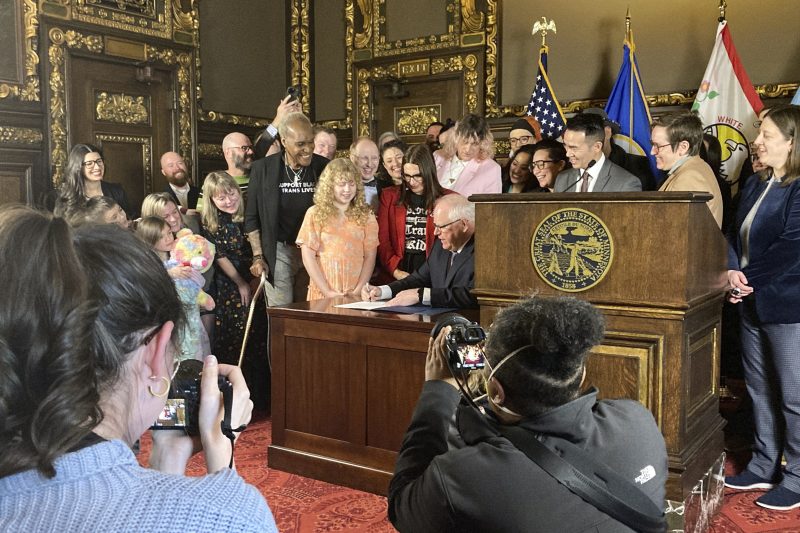Before he joined the Democratic presidential ticket, Minnesota Gov. Tim Walz had emerged as one of the most prominent champions for transgender rights and gender-affirming care as legislation restricting access proliferated across the country.
In March 2023, Walz issued an executive order protecting trans patients’ ability to receive medical care that helps them live according to their gender identity. The order also shields patients, parents and providers from punishment by other states for seeking and delivering such care. The next month, he signed legislation enshrining similar protections that supporters said would establish Minnesota as a “trans refuge.”
After Vice President Kamala Harris named Walz as her running mate, conservatives began attacking those actions, falsely accusing him of allowing the state to terminate parental custody if parents prevent their trans children from receiving gender-affirming care.
The Minnesota law allows courts to have “temporary emergency jurisdiction” if a child has been unable to obtain gender-affirming care. Kat Rohn, executive director of OutFront, an LGBTQ+ advocacy organization in St. Paul, said the law gives courts the ability to resolve disputes when parents disagree on whether their child should receive gender-affirming care; it does not remove custody from parents who decline such care.
In providing gender-affirming care for trans children and adolescents, clinicians may offer patients counseling to assist in their social transition to match their gender identity such as changing their names, pronouns and hair styles. They may also prescribe puberty-suppressing treatments under close monitoring. They generally do not offer genital surgeries until adulthood.
Republican nominee Donald Trump said on Fox News on Wednesday that Walz is “very heavy into transgender. Anything transgender he thinks is great.” As president, Trump and his administration restricted the rights of transgender people, including barring them from military service and eliminating protections against discrimination in health care. Trump, in his campaign, has vowed to bar federal agencies from promoting the concept of gender transition.
His campaign spokeswoman Karoline Leavitt also appeared on Fox News on Tuesday to criticize Walz for signing legislation that makes menstrual products available in school restrooms, regardless of gender, to accommodate transgender students.
LGBTQ+ advocates praised the governor for his record as a forceful defender of transgender rights and his broader support for their community, stretching back to 1999, when he served as faculty adviser to the gay-straight alliance club at the high school where he coached football and taught social studies. Erin Reed, an LGBTQ+ activist who tracks legislation targeting the community, described Walz on X as “one of the most protective governors towards trans people.”
Minnesota’s adoption of protections for transgender people coincided with some of its neighboring states — North Dakota, South Dakota, Iowa and Nebraska — restricting access to gender-affirming health care.
Walz entered his second term as governor in 2023 after Minnesota voters elected a dozen state lawmakers who identified as LGBTQ+ — the most in state history. The Democratic legislators formed a “queer caucus” that prioritized passing a trans refuge bill designed to prevent the state from enforcing court orders from other states to remove children from parents who approve gender-affirming care.
Minnesota Rep. Leigh Finke (D), the state’s first openly transgender lawmaker and leader of the caucus, said she asked the governor’s aides if Walz could issue an executive order as she worked on passing the trans refuge bill in a legislature where Democrats held the Senate majority by just one seat. Walz’s 2023 order buoyed those efforts, activists said.
“I cannot imagine the stress that families and individuals go through, but here in Minnesota, we’re going to be a place of refuge to make sure that they feel safe and welcome,” Walz said in a news conference announcing his executive order.
He also blasted Republican politicians who restricted access to care as bullies. Half of all states enacted laws or policies limiting youth access to gender-affirming care, including 23 that imposed penalties on health-care practitioners who offered such care, according to KFF, a health policy organization.
“Imagine what the human emotion was in that room when they did that with absolutely nothing to gain for themselves, not following any factual data and simply using the state apparatus to bring cruelty down on the most innocent amongst us,” Walz said at the time.
Walz’s stance was especially notable coming from a Democrat from a rural area who represented a swing district in Congress. Activists credited him for making the issue mainstream by casting access to gender-affirming care as fitting into Midwestern values of caring for neighbors and his broader vision for making Minnesota the best state in which to raise kids.
Dave Edwards, whose 14-year-old transgender daughter stood by Walz as he signed the executive order and trans refuge bill, said the governor’s matter-of-fact approach to supporting trans rights sets a model for people who do not have a personal connection to the issue.
“He communicates that ‘I care about everyone, so of course I care about you and I don’t need to look like you or sound like you to know your lives are important,’ ” said Edwards, who advocates for gender inclusivity in schools. “To have someone just frame things like ‘trans people exist’ feels like a breath of fresh air.”
Rohn, the LGBTQ+ advocate, recalled Walz pulling her aside during an LGBTQ+ lobbying day at the Capitol and asking how he could support those facing vitriolic online harassment while the bill was being considered.
Finke, the transgender lawmaker who was a prime target of the harassment, said Walz would periodically inquire about her well-being.
“He cares about doing what’s right,” Finke said. “I was inspired by his willingness to champion our rights at a time when we are vulnerable”
Walz’s backing of the bill continues to draw intense criticism from Republicans and conservative activists who said it threatened parental rights, mischaracterizing what the law does.
Jeff Evans, president and CEO of the Minnesota Family Council, a Christian organization, condemned “the so-called Trans Refuge bill which could take children away from their parents if parents do not provide access to harmful ‘gender-affirming care,’ ” in an X post after Harris tapped Walz as her running mate.
Conservative radio host Megyn Kelly falsely accused Walz of signing a bill that lets the state take away children from parents who do not agree to “sterilize them & chop off their body parts in the name of ‘gender affirming care.’ ”
For trans advocates, Walz’s support came at a crucial moment.
A. Kade Goepford, medical director of the gender health program at Children’s Minnesota, said the organization has seen an increase in phone calls from out-of-state parents seeking gender-affirming care for their children.
“Knowing that Minnesota was a place that their children and their families would belong and could get the health care they needed,” Goepford said, helped cement Minnesota in their eyes as “the best place for us to raise our family.”








